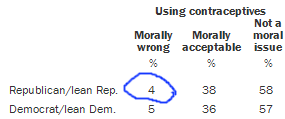very few people – just 4% of all U.S. adults – think contraception is immoral. 5% Democrats and 4% of Republicans
- Pew poll, September 2016.
In other words,
There is no conservative argument against contraception...
... because an overwhelming majority of conservatives and conservative movement as a whole ...
... are NOT against contraception in the first place.
So asking what it is, is a fallacy.
While there may be some individual politicians who happen to be conservative, who are against contraception on a personal level, the official position of the Republican party or its conservative wing is neither pro nor against contraception (I'm excluding "Plan B" since many people - rightly or wrongly - group that in "abortion" and not "contraception" in their thinking).
Unlike the other answers here that make up politically popular facts, I can easily prove my point, with an actual poll.
From September 2016 Pew poll titled "Where the Public Stands on Religious Liberty vs. Nondiscrimination"
very few people – just 4% of all U.S. adults – think contraception is immoral.
Even when it comes to Catholics who attend Mass weekly, just 13% say contraception is morally wrong, while 45% say it is morally acceptable and 42% say it is not a moral issue. (The Roman Catholic Church teaches that use of artificial contraception is sinful.)
Specific party breakdown was 5% Democrats and only 4% Republicans view contraception as morally wrong:

Another proof is that there are precisely:
Zero laws on the books, in even the most conservatives states/locales, banning sales of contraceptives, or use of contraceptives.
To the best of my knowledge, zero serious proposals (laws put to a vote, or referendums, or planks in political party) to introduce such laws.
The actual truth, if you look at the raw facts and not anti-Republican slogans, is that what Republicans and conservatives are against is forcing people to pay for other people's contraception.
This takes two different forms:
Opposition to using tax money to pay for contraception[2].
Opposition to forcing private organizations to pay for contraception - more specifically, to pay for medical "insurance"[1] coverage that covers contraception. Again, the opposition isn't to the insurance itself - it's to forcing an organization to choose the insurance plan which pays for contraception (which means that the organization itself, in effect, pays for it).
To understand this in less politically controversial terms, consider a hypothetical situation. There is a pro-cat political party, and an anti-cat political party.
What the anti-cat party is against is:
Laws that use tax money - including those collected from anti-cat voters - to pay for pro-cat policies.
Laws forcing private companies to keep cats for employees to play with (and pay for that).
Now that we took off the emotional veil, I think anyone who's not deeply invested in pro/anti-cat sentiment can see that those two laws are extremely unfair towards anti-cat people.
Now, if you ask what the conservative argument is against forcing people to pay for other people's modern contraception,
the ideological answer is "because it violates the freedom of people".
there is also an additional set of purely political arguments for why it's a noisy issue (it is an issue that arouses a lot of sentiment in voters, and thus gets voter enthusiasm and money and volunteering)
A separate angle that was brought out by someone in comments highlights one of the bigger divides between conservatives and libertarians on one side and progressives on another: positive vs. negative rights (of which contraceptives is but one small example illustration).
This division concerns positive and negative rights - the right to have something, vs. the right to be free from some sort of interference from others.
In general, conservatives and libertarians subscribe to negative rights as being more important in general, and progressives, view positive rights as more important.
In that context, contraceptive political positions make perfect sense:
Those on the left, often view entire medicine, and including contraceptives, as a positive human right - meaning they think that being given (and paid for by others if you can't afford it) is a right.
Those on the right, view at the very least contraceptives (and sometimes, other non-essential medicine) as NOT a fundamental human right which everyone must be given access to, but as an optional luxury. If you want it, you are free to pay for it. If you can't, go without. However, to them, negative right (specifically in case of contraception, religious liberty to NOT be forced to pay for someone else's contraceptive) is important as a concept regardless of whether they personally consider contraceptives OK (an overwhelming majority) or are among the rare 4% of people who do not.
[1] I use quotations here on purpose. For those not too familiar with US healthcare system, most US medical "insurance" is not really a "real" catastrophic insurance which is designed to pay for medical emergencies and other unanticipated medical expenses, the way normal insurance works. Instead, it pays for routine medical expenses, e.g. wellness doctor visits, medicine, and in case of some insurances, contraception is included in the routine expenses the insurance covers.
[2] - I didn't want to include this point into the main answer, as it's already overly long. But the controvercial rule from Trump administration which may have been one impetus for this question, was actually NOT about contraception at all, despite the opposition trying to paint it this way. It was against funding Planned Parenthood's abortion services using taxes. It very specifically allowed funding for birth control - the problem was that Planned Parenthood can't easily separate the two as the same branch does both. But, the way the rule was worded, it was very explicitly NOT directly affecting contraception.
